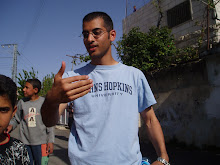 July 5
July 5Left: A soldier checks my passport at one of the old city's check-points.
"Welcome to Hebron", as the billboard outside the Tomb of our Patriarchs says. The billboard is signed "The Jewish Community of Hebron"
I had lunch with Katie and Ameer, and then headed to the airport. The train from Haifa goes directly to Tel Aviv airport, which was awesome. I was a bit worried, since the last I had heard of a train in Israel was when one crashed with my friend Naomi on board, but thankfully the trip was fine. Everyone in the train station fulfilled the stereotype of the rude Israeli to a T, but the station and the train themselves were really nice. The announcements on the train are in Hebrew and English.
Going through security at Ben-Gurion Airport was interesting. It was the same thing that happened last time, just in reverse: first all of my stuff was laid out, scanned, swabbed and whatever else. Then I was taken to a room where I had to take my pants off (apparently linen is hard to feel things through) so they could wave a metal detector in front of my crotch. Then I went back out to where my stuff had been thrown all over the place and watched three attractive young women examine my underwear and ophthalmoscope. My favorite part was when one of them said, “I’m very sorry sir, but we accidentally turned your computer on.” Then I looked at it and it was off. “Oh, I think maybe we must have turned it off, too.” You'd think a country so well known for having die-hard spies who infiltrate foreign governments and assassinate political opponents would employ people with a brain to guard the airport.
I can understand how a normal person, especially a Palestinian (or, say, an eighty-year-old German-born Jewish woman who came to Palestine to help the Palestinians), would find this humiliating in the extreme. I suspect that's the purpose of the whole venture to begin with. But for me, I found the idea of three hot Israeli women telling me what to do quite amusing. An old lady brought her bag over to the counter and one of the bag checkers asked me to put it up on the table; after I did that they were more relaxed for some reason, maybe because the woman said “thank you” in Hebrew and I responded appropriately. I spent the next twenty minutes talking to one of the bag checkers about why I have a blood pressure cuff; not interrogation-style, she was just curious if I was a doctor. Then that same woman walked me to the gate where my plane was going to take off. Total time going through security: three hours.
When I got on the plane there was a large Orthodox Jewish woman sitting across the aisle from me with a baby. She asked me something in Hebrew, and I gave my standard “anni lo yodea ivrit” (a pathetic attempt at “I don’t speak Hebrew”).
Then she said in American English, “my husband and I were separated, can he have your seat?” I said of course, but he just kept staring at the floor until I said "yala" and pointed him towards my seat. He was awkward the way Orthodox Jewish men always are; why, I still don't understand.
When the captain gave the “please be seated” announcement a flight attendant came over to the man who’d taken my seat and asked him in English (it was a British Airways flight) “What is your name, sir?” He looked up at her blankly; I’m sure he understood, but that awkward thing came out again. She became very aggressive and practically screamed at him, “Sir, I need to know your name immediately!”
His wife leaned in and said “he doesn’t speak English” then told her husband, in Hebrew, to tell the lady his name. He did so, but the lady didn’t understand and just got more annoyed.
“Where is the person who is supposed to sit in this seat?” she asked. I’d been watching this with amusement; Jews obviously never get this treatment at Ben-Gurion Airport (unless they're helping Palestinians...). Eventually I stood up and said “I’m right here, ma’am.”
“Ah, okay.” And she walked away. Needless to say, she didn’t look for any other specific passengers, and I don't recall seeing that flight attendant again.
And that concluded my summer in Palestine. Someone stole my camera in Heathrow Airport while I was napping on a chair, so I lost my pictures from my last few days, including my only picture with Dr. Nisreen. You spend six weeks in a third world country under brutal military occupation, subject to international economic sanctions and the whims of two separate groups of religious fanatics, but nobody steals so much as a penny from you. Then you fly to the wealthiest city in the world and some intercontinental traveler steals your camera. Unbelievable.


